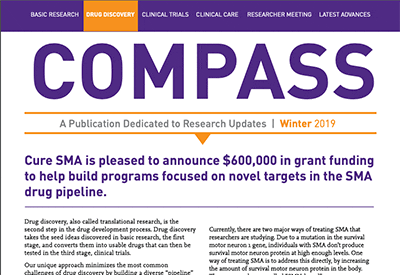Each year, Cure SMA invites scientists from around the world to submit funding proposals for basic research projects that address specific unanswered questions in SMA biology. Our Scientific Advisory Board then ranks the submitted proposals on both their scientific merit and relevance to Cure SMA’s research priorities. Funding is awarded to the highest ranked projects.
In 2023, Cure SMA awarded a total of $750,000 to six scientists to pursue our basic research priorities and objectives.
Allison Ebert, PhD, at The Medical College of Wisconsin was awarded $150,000 for her research project, “The role of teneurin 4 and actin dynamics in SMA astrocyte perisynaptic processes.”
Meet Dr. Ebert
Dr. Ebert originally became involved in SMA research about 15 years ago when she was a postdoctoral fellow. As part of her postdoctoral research, she worked with an SMA research expert, Chris Lorson, to develop a new human stem cell model for SMA. Today, Dr. Ebert leads a basic science lab where her research group studies how non-neuronal cells contribute to motor neuron loss in neurological diseases.
The brain and spinal cord are made up of neuronal and non-neuronal cells. Neuronal cells, like motor neurons, perform advanced functions like carrying messages from the brain to muscles. Non-neuronal brain cells, like astrocytes, support the structure and function of the more complex neuronal cells. Dr. Ebert’s previous research has shown that in SMA, astrocytes undergo changes that prevent them from being able to adequately support motor neurons.
In this project, Dr. Ebert’s research group will use a human stem cell model to determine how the loss of a specific protein, teneurin (TENNM4), affects the ability of astrocytes to support motor neurons. They will utilize a range of laboratory techniques, including microscopy and protein biochemistry, to learn more about how astrocytes develop and function in the absence of TENM4. Dr. Ebert and her colleagues will also determine whether supportive function can be restored to astrocytes by adding back the missing protein.
Learning more about the effects of SMA on non-neuronal cells will contribute to researchers’ overall understanding of the disease process. Dr. Ebert also hopes the results of this project will uncover new targets for SMA therapeutics that, combined with existing therapies, can achieve the best possible outcomes for people with SMA.

Cure SMA’s top basic research priorities currently include:
- Learning more about when and where the survival motor neuron (SMN) protein is needed and how it functions in the body.
- Finding new ways to treat SMA, especially those that can be used in combination with approved drugs.
- Using cellular or animal models to better understand the SMA disease process.
- Developing new tools for SMA research, such as new SMA animal models and new ways of tracking disease progression.
Thank You!
Special thanks to the Concepcion Family, Nunemaker Family, Weisman Family, Luke 18:1 Foundation and Dhont Foundation for their generosity to Cure SMA in our quest to invest in basic research that will ultimately drive the next generation of SMA treatments.



